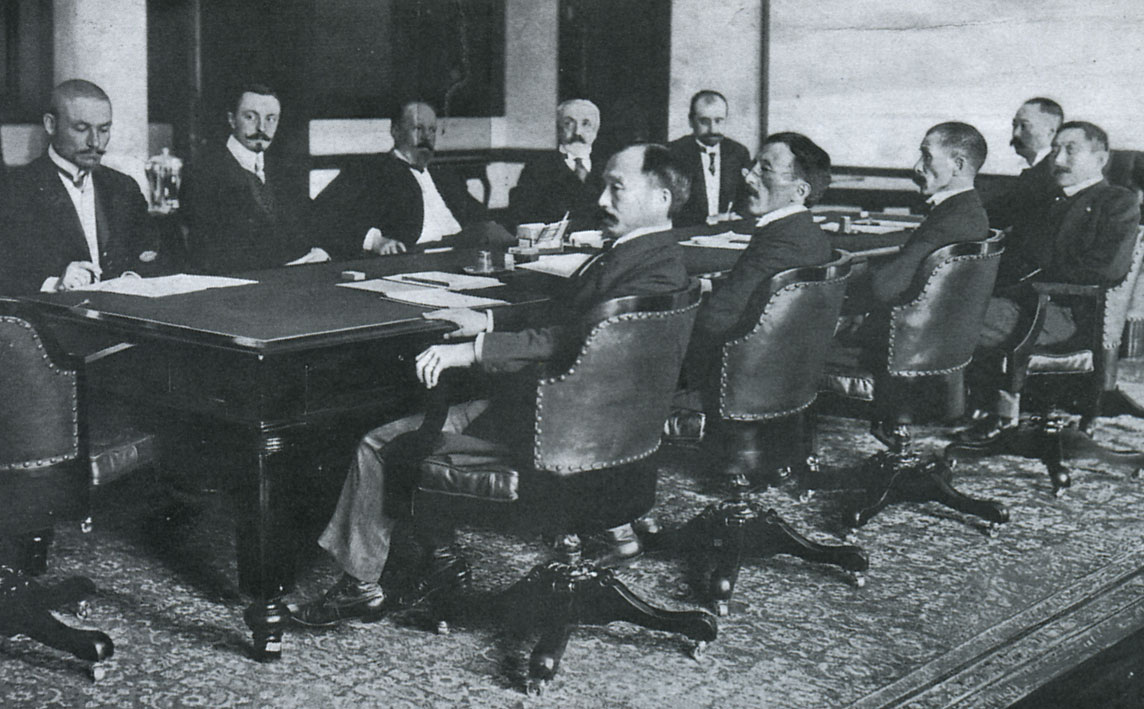-----------------------
Venäjän–Japanin sota käytiin vuosina 1904–1905 Japanin ja Venäjän keisarikuntien välillä. Sota päättyi monien aikalaisten yllätykseksi Japanin voittoon, ja maan suurvaltakauden voi katsoa alkavan konfliktin päättäneestä Portsmouthin rauhansopimuksesta.
Sota aiheutti Venäjällä voimakasta yhteiskunnallista liikehdintää, niin sanotun vuoden 1905 vallankumouksen, joka johti lopulta perustuslailliseen monarkiaan. Suomen suuriruhtinaskunnassa levottomuudet johtivat ensimmäisen sortokauden päättymiseen ja vuoden 1906 eduskuntauudistukseen.
Carl Gustaf Emil Mannerheim oli sodassa mukana.
Venäjän–Japanin sotaa on kuvailtu ensimmäisen maailmansodan harjoitukseksi.
Sitä on toisinaan pidetty ensimmäisenä nykyaikaisena sotana

Venäjän ja Japanin delegaatiot solmimassa Portsmouthin rauhansopimusta
Venäjän - Japanin sota 1904
-----------------------------------------
Russia sought a warm-water port on the Pacific Ocean for their navy and for maritime trade. Vladivostok was operational only during the summer, whereas Port Arthur, a naval base in Liaotung Province leased to Russia by China, was operational all year. Since the end of the First Sino-Japanese War in 1895, negotiations between Russia and Japan had proved impractical.
Russia had demonstrated an expansionist policy in Manchuria dating to the reign of Ivan the Terrible in the 16th century. Through threat of Russian expansion, Japan offered to recognize Russian dominance in Manchuria in exchange for recognition of Korea as within the Japanese sphere of influence. Russia refused and demanded Korea north of the 39th parallel to be a neutral buffer zone between Russia and Japan.
The Japanese government perceived a Russian threat to its strategic interests and chose to go to war. After negotiations broke down in 1904, the Japanese Navy opened hostilities by attacking the Russian Eastern Fleet at Port Arthur in a surprise attack.
Russia suffered numerous defeats to Japan, but Tsar Nicholas II was convinced that Russia would win and chose to remain engaged in the war; at first, to await the outcomes of certain naval battles, and later to preserve the dignity of Russia by averting a "humiliating peace". The war concluded with the Treaty of Portsmouth, mediated by US President Theodore Roosevelt at the Portsmouth Naval Shipyard on Seavey's Island, Kittery, Maine, while the delegates stayed in Portsmouth, New Hampshire.
The complete victory of the Japanese military surprised world observers. The consequences transformed the balance of power in East Asia, resulting in a reassessment of Japan's recent entry onto the world stage. Scholars continue to debate the historical significance of the war.
| Russo-Japanese War | |||||||
|---|---|---|---|---|---|---|---|
 Clockwise from top: Russian cruiser Pallada under fire atPort Arthur, Russian cavalry at Mukden, Russian cruiserVaryag and gunboat Korietz at Chemulpo Bay, Japanese dead at Port Arthur, Japanese infantry crossing the Yalu River | |||||||
| |||||||
| Belligerents | |||||||
| Commanders and leaders | |||||||
| Strength | |||||||
| 300,000–500,000 | 500,000–1,000,000 | ||||||
| Casualties and losses | |||||||
|
| ||||||
The Russians and the Japanese both contributed troops to the eight-member international force sent in 1900 to quell the Boxer Rebellion and to relieve the international legations under siege in the Chinese capital, Beijing. Russia had already sent 177,000 soldiers to Manchuria, nominally to protect its railways under construction.
Russo Japanese War
Russo Japanese War
---------
The troops of the Qing Empire and the participants of the Boxer Rebellion could do nothing against such a massive army and were ejected from Manchuria. The Russian troops settled in and despite assurances they would vacate the area after the crisis, by 1903 the Russians had not established a timetable for withdrawall and had actually strengthened their position in Manchuria.

Troops of the eight-nation alliance in 1900. Left to right: Britain, United States, Australia, India, Germany, France, Austria, Italy, Japan.
This is a strange one that you don't hear much about. I think the Russians had their revenge 40 years later when they sent their armies crashing into Manchuria
VastaaPoistaHello.
PoistaDo you never knew this, Port Arthur is the same as today is Sevastopol.
You need to read more about this area of the Middle East, China - Mongolia - Russia.
Russia and Japan have been fighting for a long time, and Chinese (for many inward-war)
The battle of Stalingrad solution was these fresh, rested troops who had never fought before Stalingrad.
These men had grown cold in Siberia and the originals residents, all of whom had skis, thick, good winter clothes and shoes, hunters, fishermen
a log/forest of men
Yeh I know about the fresh Siberian troops that were waiting for a Japan invasion were sent west when the Russian spies found that Japan was going to attack the USA and not Russia, They pushed the Germans back from the gages of Moscow in 1941
PoistaYeh!
PoistaWell done.
These troops were almost the same equipment as the Finnish civil guard soldiers at the time of the Winter War, and they also had skis and tents.
However, I've read (only in my memory data)
these troops used the Battle of Stalingrad